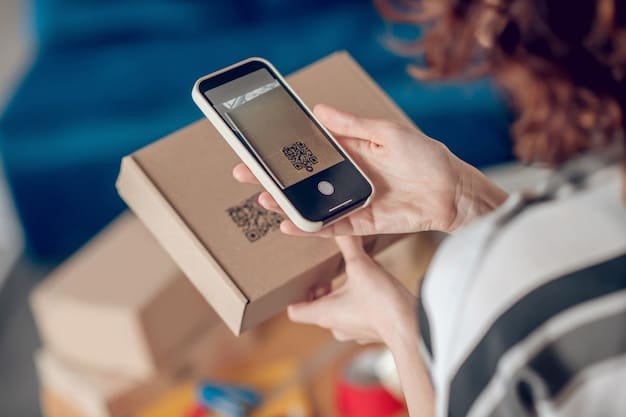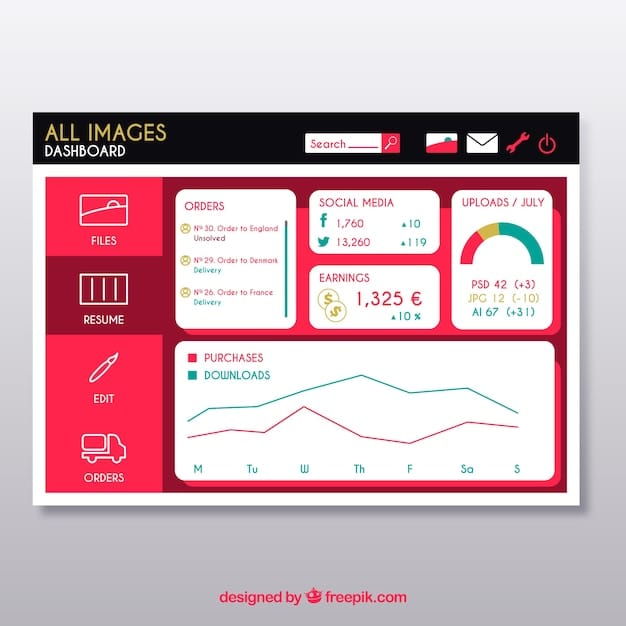Blockchain Supply Chain Management: US Tracking with 99% Accuracy

Blockchain supply chain management in the US offers near-perfect accuracy in tracking products from origin to consumer by employing a distributed, immutable ledger system that enhances transparency and efficiency.
Blockchain supply chain management: Tracking products from origin to consumer in the US with 99% accuracy is revolutionizing how businesses operate. This innovative approach ensures unparalleled transparency, security, and efficiency in tracking goods throughout their journey. Let’s delve into how blockchain is transforming supply chains and what it means for consumers and businesses alike.
Understanding Blockchain’s Role in Supply Chain Management
Blockchain technology is rapidly changing various sectors, and supply chain management is no exception. Its ability to provide a secure and transparent ledger makes it ideal for tracking products from their source to the end consumer.
What is Blockchain?
At its core, blockchain is a distributed, immutable ledger. This means that once data is recorded on the blockchain, it cannot be altered or deleted, ensuring a high level of data integrity.
Blockchain’s decentralized nature also means that there is no single point of failure. Instead, the data is distributed across many nodes, making it highly resistant to tampering and fraud.
Why Blockchain for Supply Chain Management?
Traditional supply chains often suffer from a lack of transparency, making it difficult to track products and verify their authenticity. Blockchain addresses this issue by providing a transparent and auditable record of each product’s journey.
- Enhanced Transparency: All participants in the supply chain can view the product’s history, from origin to delivery.
- Improved Security: The immutable nature of blockchain ensures that data cannot be altered, reducing the risk of fraud.
- Increased Efficiency: Automation through smart contracts can streamline processes and reduce delays.
- Better Traceability: Easily track products and verify their authenticity, reducing the risk of counterfeit goods.
In essence, blockchain enhances trust and cooperation among stakeholders in the supply chain, leading to more efficient and reliable operations.
Blockchain’s integration in supply chain management promises to streamline processes, boost transparency, and ensure product authenticity, thereby reshaping traditional supply chain operations into more agile and trustworthy systems.

The Journey of a Product on the Blockchain
To fully appreciate the impact of blockchain on supply chain management, it’s crucial to understand how a product’s journey is recorded and tracked on the blockchain network.
Data Capture at the Origin
The journey begins at the product’s origin, whether it’s a farm, factory, or manufacturing plant. Here, unique identifiers such as QR codes or RFID tags are attached to the product.
Data about the product, including its origin, manufacturing date, and any relevant certifications, is then recorded on the blockchain. This initial record serves as the foundation for all subsequent tracking.
Tracking Through the Supply Chain
As the product moves through the supply chain, each transaction or transfer is recorded on the blockchain. This includes movements between warehouses, distribution centers, and transportation carriers.
- Real-Time Updates: All stakeholders have access to real-time updates on the product’s location and status.
- Smart Contracts: Automated agreements ensure that products meet specific criteria at each stage.
- Data Validation: Each transaction is verified by multiple nodes on the blockchain, ensuring data accuracy.
The result is a comprehensive and immutable record of the product’s journey, providing unparalleled transparency and accountability.
By recording each step of a product’s journey on a blockchain, businesses can ensure transparency, reduce fraud, and build trust with consumers, transforming the traditional supply chain into a more secure and reliable network.
Achieving 99% Accuracy with Blockchain
The promise of 99% accuracy in supply chain tracking with blockchain is not just a marketing claim. It’s a reflection of the technology’s inherent capabilities and its potential to minimize errors.
Data Integrity and Immutability
One of the key reasons for blockchain’s high accuracy is its immutability. Once data is recorded, it cannot be altered, ensuring that the information remains consistent and reliable over time.
This immutability is enforced by a consensus mechanism, where multiple nodes verify each transaction before it is added to the blockchain. This reduces the risk of errors or fraudulent activities.
Smart Contracts and Automation
Smart contracts also play a crucial role in achieving high accuracy. These self-executing agreements automate many of the processes within the supply chain, reducing the potential for human error.
For example, a smart contract can automatically verify that a product meets specific quality standards before it is shipped to the next location, ensuring that only compliant products move forward.
Case Studies and Real-World Examples
Several companies have already achieved impressive results by implementing blockchain in their supply chains.
- Walmart: Uses blockchain to track mangoes from farm to store, reducing traceability time from weeks to seconds.
- IBM Food Trust: Provides a platform for tracking various food products, enhancing food safety and transparency.
- Maersk: Utilizes blockchain to manage shipping containers, improving efficiency and reducing paperwork.
These examples demonstrate that blockchain can significantly improve accuracy, reduce costs, and enhance overall supply chain performance.
By leveraging the immutability and automation capabilities of blockchain, companies can achieve unparalleled accuracy in supply chain tracking, leading to improved efficiency and reduced risks.

Benefits of Blockchain Supply Chain Management in the US
The adoption of blockchain in supply chain management offers numerous benefits to businesses and consumers in the US.
Enhanced Consumer Trust
Consumers are increasingly demanding transparency about the products they buy. Blockchain provides them with the ability to verify the authenticity and origin of goods, fostering trust and loyalty.
This is particularly important for products like food, pharmaceuticals, and luxury goods, where counterfeiting and fraud are common concerns.
Operational Efficiencies
Blockchain can streamline many of the processes within the supply chain, reducing delays, cutting costs, and improving overall efficiency.
For example, automated customs clearance and faster payment processing can significantly speed up the movement of goods across borders.
Reduced Fraud and Counterfeiting
The immutable nature of blockchain makes it difficult to counterfeit products or alter records, reducing the risk of fraud and protecting consumers from harmful goods.
This is especially valuable for industries where product safety is critical, such as pharmaceuticals and medical devices.
Challenges and Considerations
While the benefits are clear, there are also challenges to consider when implementing blockchain in supply chain management.
- Scalability: Ensuring that the blockchain network can handle a large volume of transactions.
- Interoperability: Integrating blockchain with existing systems and platforms.
- Regulation: Navigating the evolving regulatory landscape for blockchain technology.
Despite these challenges, the potential rewards make blockchain a worthwhile investment for many businesses.
The integration of blockchain technology into supply chain management in the US promises to enhance consumer trust, improve operational efficiencies, and reduce fraud, although challenges like scalability and regulatory uncertainties need consideration.
Implementing Blockchain in Your Supply Chain
Adopting blockchain for supply chain management requires careful planning and execution. Here are some key steps to consider:
Identify Key Pain Points
Before implementing blockchain, it’s essential to identify the specific challenges or inefficiencies within your supply chain that the technology can address.
This might include issues like lack of transparency, delays in delivery, or difficulties in verifying product authenticity.
Choose the Right Blockchain Platform
There are several blockchain platforms available, each with its strengths and weaknesses. Choose a platform that aligns with your specific needs and goals.
Consider factors like scalability, security, and interoperability when making your decision.
Develop a Pilot Project
Start with a small-scale pilot project to test the feasibility and effectiveness of blockchain in your supply chain. This will allow you to identify any potential issues and refine your approach before rolling out the technology on a larger scale.
Collaborate with Stakeholders
Blockchain is most effective when all participants in the supply chain are involved. Collaborate with suppliers, distributors, and customers to ensure that everyone is on board and understands the benefits of the technology.
Best Practices for Success
To maximize the chances of success, follow these best practices:
- Focus on Data Quality: Ensure that the data being recorded on the blockchain is accurate and reliable.
- Prioritize Security: Implement robust security measures to protect against cyber threats.
- Provide Training: Educate your employees and partners on how to use the blockchain platform effectively.
By following these steps and best practices, you can successfully implement blockchain in your supply chain and reap the many benefits it has to offer.
Successfully implementing blockchain in a supply chain requires identifying pain points, choosing the right platform, starting with a pilot project, and collaborating with stakeholders, while focusing on data quality, security, and training.
The Future of Blockchain in Supply Chain Management
The future of blockchain in supply chain management looks promising, with ongoing developments and innovations poised to further transform the industry.
Emerging Trends and Technologies
Several emerging trends are shaping the future of blockchain in supply chain management.
One is the integration of IoT (Internet of Things) devices, which can provide real-time data about product conditions and location. This data can be recorded on the blockchain, providing even greater transparency and accuracy.
The Role of Artificial Intelligence
Artificial intelligence (AI) is also playing an increasingly important role. AI algorithms can analyze the data on the blockchain to identify patterns, predict demand, and optimize supply chain operations.
Additionally, AI can automate tasks like fraud detection and risk management, further enhancing the security and efficiency of the supply chain.
Predictions and Projections
Experts predict that blockchain adoption in supply chain management will continue to grow rapidly in the coming years.
As more companies recognize the benefits of the technology, we can expect to see increased investment in blockchain solutions and greater collaboration among stakeholders.
Final Thoughts
Blockchain supply chain management represents a significant advancement in how businesses operate. By providing transparency, security, and efficiency, it has the potential to transform the way products are tracked and delivered to consumers.
As the technology continues to evolve, we can expect to see even greater innovation and adoption in the years to come.
With the integration of IoT and AI, blockchain is set to revolutionize supply chain management further, promising increased efficiency, transparency, and enhanced consumer trust in the years to come.
| Key Point | Brief Description |
|---|---|
| 📦 Transparency | Enhances visibility across the entire supply chain. |
| 🔒 Security | Immutable ledger reduces fraud and counterfeiting. |
| ⏱️ Efficiency | Streamlines processes and reduces delays with automation. |
| ✅ Accuracy | Aims for near-perfect product tracking from origin to consumer. |
FAQ
▼
Blockchain supply chain management uses a decentralized ledger to track goods from origin to consumer. It enhances transparency, security, and efficiency by recording each step of the product’s journey on an immutable blockchain.
▼
Blockchain improves accuracy through its immutable nature and the use of smart contracts. Once data is recorded, it cannot be altered, ensuring reliability. Smart contracts automate processes, reducing human error and validating data.
▼
Benefits include enhanced consumer trust through transparency, operational efficiencies by streamlining processes, reduced fraud with an immutable ledger, and improved product safety by tracking authenticity throughout the supply chain.
▼
Challenges include ensuring scalability to handle large transaction volumes, achieving interoperability with existing systems, navigating regulatory uncertainties, and securing the blockchain network against potential cyber threats and vulnerabilities.
▼
The future involves greater integration with IoT and AI, enabling real-time data collection and optimized operations. Continued growth in adoption is expected as more companies recognize the benefits, leading to increased investment and collaboration.
Conclusion
In conclusion, blockchain supply chain management: Tracking products from origin to consumer in the US with 99% accuracy promises a revolutionary impact. With enhanced transparency, security, and efficiency, blockchain is set to transform how businesses operate and build consumer trust. Despite challenges, the potential benefits make it a worthwhile investment for the future of supply chains.





